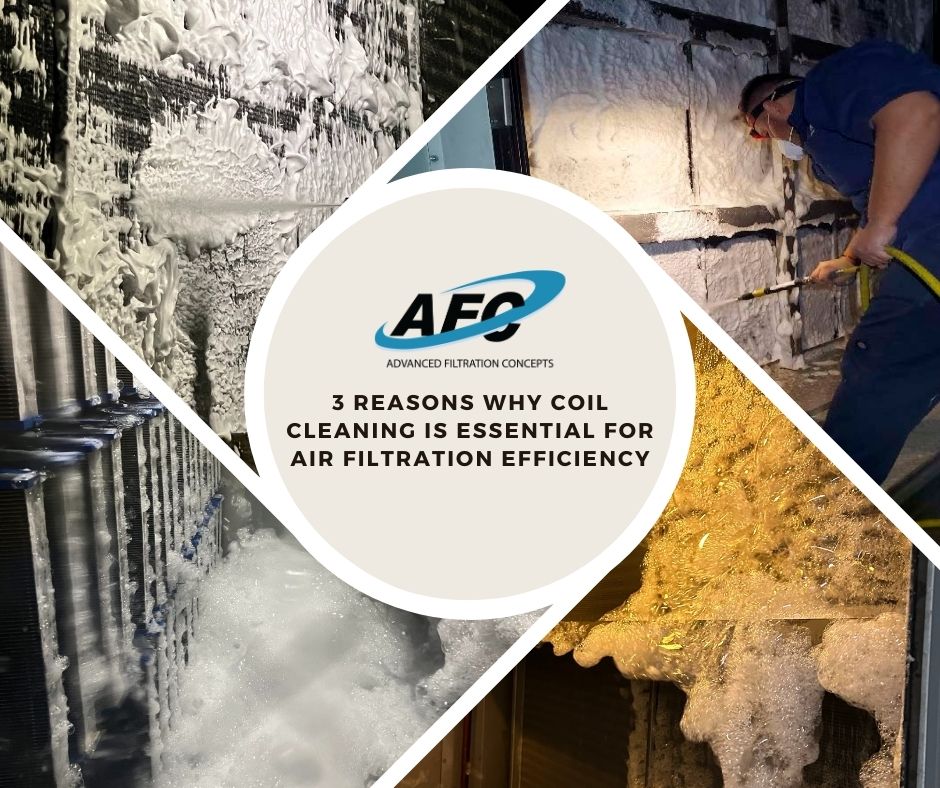Coil Cleaning
Maintaining a healthy and efficient HVAC (Heating, Ventilation, and Air Conditioning) system is crucial for both commercial and industrial settings. One often-overlooked aspect of HVAC maintenance is coil cleaning. Dirty coils not only reduce the system’s efficiency but also have a detrimental impact on indoor air quality. In this blog post, we’ll discuss three key reasons why coil cleaning is essential for HVAC maintenance and air filtration efficiency. We’ll also introduce Advanced Filtration Concepts, a leading company in the field of air filtration products and services, and highlight how they can assist with coil cleaning and ongoing maintenance.
Enhanced Energy Efficiency
Dirty coils can significantly decrease the energy efficiency of your HVAC system. When the evaporator and condenser coils are covered in dust, dirt, and grime, they cannot transfer heat effectively. As a result, your system has to work harder and consume more energy to achieve the desired temperature, leading to higher energy bills.
By regularly cleaning the coils, you can ensure that they operate at peak efficiency. This not only reduces energy consumption but also extends the lifespan of your HVAC equipment, saving you money in the long run.
Advanced Filtration Concepts offers expert coil cleaning services that can help improve the energy efficiency of your HVAC system. Their experienced technicians use advanced equipment and techniques to remove dirt and debris from coils, ensuring your system operates at its best.
Improved Indoor Air Quality
Another crucial reason to prioritize coil cleaning is its direct impact on indoor air quality. When coils are dirty, they can become a breeding ground for mold, bacteria, and other harmful contaminants. As air passes over these contaminated coils, it can carry these pollutants into the building, leading to poor indoor air quality.
Clean coils, on the other hand, promote better air filtration efficiency. They allow the air filters to work more effectively by preventing particles from bypassing the filter media. This results in cleaner and healthier indoor air for building occupants.
Advanced Filtration Concepts specializes in air filtration products and services. They offer a wide range of high-quality filters and can help you select the right filtration solutions to complement your coil cleaning efforts. Their expertise in both coil cleaning and air filtration ensures comprehensive indoor air quality improvements.
Prevents Costly Repairs
Neglecting coil cleaning can lead to costly HVAC repairs down the line. As dirt and debris accumulate on the coils, they can cause corrosion and damage to the coil surfaces. This not only reduces the efficiency of your system but also increases the risk of component failure.
Regular coil cleaning can prevent these issues by preserving the integrity of the coils. By investing in routine maintenance, you can avoid unexpected breakdowns and the associated repair costs.
Advanced Filtration Concepts offers ongoing maintenance services to ensure your HVAC system remains in top condition. Their preventive maintenance programs include coil cleaning and other essential tasks, helping you avoid expensive repairs and downtime.
Conclusion
Coil cleaning is a vital aspect of HVAC maintenance that should not be overlooked. It enhances energy efficiency, improves indoor air quality, and prevents costly repairs. To ensure your HVAC system operates at its best and maintains healthy air quality, consider enlisting the services of Advanced Filtration Concepts.
As a leading company in air filtration products and services, Advanced Filtration Concepts offers expert coil cleaning services and comprehensive maintenance programs. Their commitment to excellence ensures that your HVAC system operates efficiently and provides clean, healthy indoor air for your commercial or industrial facility. Don’t wait until your HVAC system underperforms or indoor air quality deteriorates – contact Advanced Filtration Concepts today to take the first step toward optimal HVAC maintenance and air filtration efficiency.

